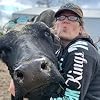Gracie Gilmour
asked
Kali Wallace:
What inspired you to write shallow graves? and do you have any advice for a girl with a pen and notebook with writers block?
Kali Wallace
I've always loved monster stories--horror novels, ghost stories, TV shows about people living alongside creepy secret supernatural worlds. (I used to be obsessed with Supernatural, which is probably fairly obvious to anybody who reads my book.) After reading and watching enough of those stories, many of which are about the humans trying to escape or hunt the monsters, I started to wonder what life looked like from the monsters' points of view. What if they were just people? What if they had families and friends and jobs? What if they never wanted to be monsters in the first place? What if they're just trying to get along like everybody else? That was the first seed of the idea.
As for advice for writer's block--oof, that's a tough one, because there are so many different reasons why writing might become difficult or impossible. I'm not going to try to offer advice about things like health/mental health issues or family problems or school/job stress, because I am very much the wrong person to advise a stranger on that, but it can help to remember that sometimes there are factors that having nothing to do with writing that are making writing such a slog.
And if that's the case: it's okay. It's okay not to write. It really is. It doesn't make you any less of writer to have other things occupying your time and energy. It's okay if creative work is too difficult for a day, or a week, or a month, or even years. Don't punish yourself for having a health or family or work concerns that are affecting your creative life. It's okay to focus on the things demanding so much of your time and emotional energy. It really is okay.
But if it really is about the writing, and not external problems overwhelming the writing, well, in that case I tend to find that it helps to ask myself some questions about why I'm so stuck. And it depends a little bit on what exactly is going on.
If I'm stuck on a specific story, something I've started writing, and maybe it was going well for a while but then I hit a quagmire and can't make any new progress, I have to force myself to take a step back and think about why I'm having trouble pushing forward. Am I trying to push the story in a direction that no longer feels quite right? Are my characters making decisions that don't seem to make much sense anymore? Am I trying to write toward a conclusion that once seemed interesting but now doesn't fit? Am I making things too complicated? Am I making things too simple? There are a lot of story-related reasons why I might feel stuck, and usually if I ask really tough questions about what I'm doing, and why, I can tease out some of those reasons, and figure out a way forward.
Now, if I'm feeling blocked because I have TOO MANY IDEAS and no idea what to focus on, that's another problem entirely! And not at all an uncommon one--I think that's something that all writers face at some point. Writing is hard work, and diving into a story or novel is a massive commitment. Not just a time commitment, although it is that, but an emotional and intellectual commitment too. It's not always easy to figure out where to direct your energy, so it's really no wonder that we all get stuck at the "But what do write? Where do I even begin? What if I pick the wrong idea?" stage.
What I do then is feel around for the idea that I can't stop thinking about. Not the one that I think is most marketable, not the one that I think other people want most, not the one that I think is easiest or most straightforward, but the one that I want to think about when I'm falling asleep, and the one I think about when I'm waking up. I think about it until I can fix on some kind of vivid scene or image--it doesn't have to be a whole plot, or even a coherent part of a plot. Just some image that feels real and alive to me. I don't worry about whether it's the right place to start the story, or whether it's the right story. It's just one scene, but it's a start.
More practically, I also sometimes trick myself by giving myself super easy goals: I can write 100 words. I can write 200 words. That's all. Then I can stop for the day. 100 words is barely a paragraph, right? I usually--not always! but usually--find that after I've written a couple hundred words, the next couple hundred words come easier. And even if they don't, that's okay. I still wrote a couple hundred words.
As for advice for writer's block--oof, that's a tough one, because there are so many different reasons why writing might become difficult or impossible. I'm not going to try to offer advice about things like health/mental health issues or family problems or school/job stress, because I am very much the wrong person to advise a stranger on that, but it can help to remember that sometimes there are factors that having nothing to do with writing that are making writing such a slog.
And if that's the case: it's okay. It's okay not to write. It really is. It doesn't make you any less of writer to have other things occupying your time and energy. It's okay if creative work is too difficult for a day, or a week, or a month, or even years. Don't punish yourself for having a health or family or work concerns that are affecting your creative life. It's okay to focus on the things demanding so much of your time and emotional energy. It really is okay.
But if it really is about the writing, and not external problems overwhelming the writing, well, in that case I tend to find that it helps to ask myself some questions about why I'm so stuck. And it depends a little bit on what exactly is going on.
If I'm stuck on a specific story, something I've started writing, and maybe it was going well for a while but then I hit a quagmire and can't make any new progress, I have to force myself to take a step back and think about why I'm having trouble pushing forward. Am I trying to push the story in a direction that no longer feels quite right? Are my characters making decisions that don't seem to make much sense anymore? Am I trying to write toward a conclusion that once seemed interesting but now doesn't fit? Am I making things too complicated? Am I making things too simple? There are a lot of story-related reasons why I might feel stuck, and usually if I ask really tough questions about what I'm doing, and why, I can tease out some of those reasons, and figure out a way forward.
Now, if I'm feeling blocked because I have TOO MANY IDEAS and no idea what to focus on, that's another problem entirely! And not at all an uncommon one--I think that's something that all writers face at some point. Writing is hard work, and diving into a story or novel is a massive commitment. Not just a time commitment, although it is that, but an emotional and intellectual commitment too. It's not always easy to figure out where to direct your energy, so it's really no wonder that we all get stuck at the "But what do write? Where do I even begin? What if I pick the wrong idea?" stage.
What I do then is feel around for the idea that I can't stop thinking about. Not the one that I think is most marketable, not the one that I think other people want most, not the one that I think is easiest or most straightforward, but the one that I want to think about when I'm falling asleep, and the one I think about when I'm waking up. I think about it until I can fix on some kind of vivid scene or image--it doesn't have to be a whole plot, or even a coherent part of a plot. Just some image that feels real and alive to me. I don't worry about whether it's the right place to start the story, or whether it's the right story. It's just one scene, but it's a start.
More practically, I also sometimes trick myself by giving myself super easy goals: I can write 100 words. I can write 200 words. That's all. Then I can stop for the day. 100 words is barely a paragraph, right? I usually--not always! but usually--find that after I've written a couple hundred words, the next couple hundred words come easier. And even if they don't, that's okay. I still wrote a couple hundred words.
More Answered Questions
About Goodreads Q&A
Ask and answer questions about books!
You can pose questions to the Goodreads community with Reader Q&A, or ask your favorite author a question with Ask the Author.
See Featured Authors Answering Questions
Learn more






May 13, 2016 01:24PM · flag
May 18, 2016 12:40PM · flag